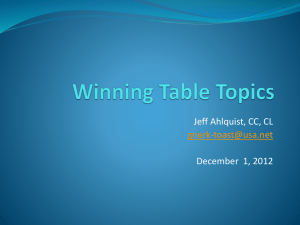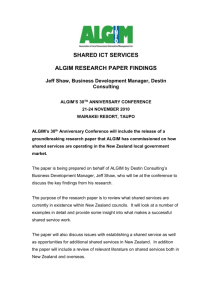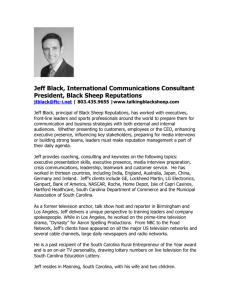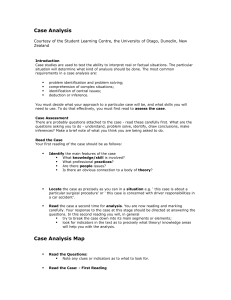THE VISION COUNCIL Moderator: Amber Robinson 03-19
advertisement
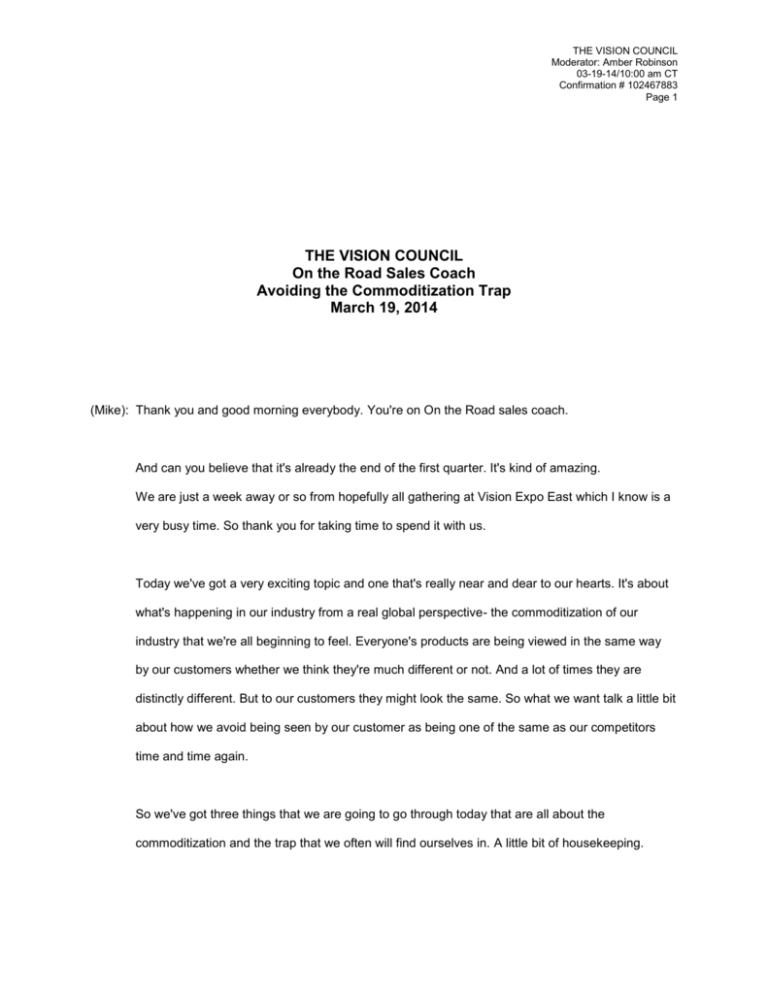
THE VISION COUNCIL Moderator: Amber Robinson 03-19-14/10:00 am CT Confirmation # 102467883 Page 1 THE VISION COUNCIL On the Road Sales Coach Avoiding the Commoditization Trap March 19, 2014 (Mike): Thank you and good morning everybody. You're on On the Road sales coach. And can you believe that it's already the end of the first quarter. It's kind of amazing. We are just a week away or so from hopefully all gathering at Vision Expo East which I know is a very busy time. So thank you for taking time to spend it with us. Today we've got a very exciting topic and one that's really near and dear to our hearts. It's about what's happening in our industry from a real global perspective- the commoditization of our industry that we're all beginning to feel. Everyone's products are being viewed in the same way by our customers whether we think they're much different or not. And a lot of times they are distinctly different. But to our customers they might look the same. So what we want talk a little bit about how we avoid being seen by our customer as being one of the same as our competitors time and time again. So we've got three things that we are going to go through today that are all about the commoditization and the trap that we often will find ourselves in. A little bit of housekeeping. THE VISION COUNCIL Moderator: Amber Robinson 03-19-14/10:00 am CT Confirmation # 102467883 Page 2 As you know this is a free member benefit from The Vision Council. And it's a wonderful benefit and we are so appreciative of the fact that all of you are on board with us. You've all been muted and we also encourage you to make sure that you're using a hands free device if you're on the road. And that your safety is the number one concern for all of us. So while we're going to be talking about some really great stuff it's also important that you're safe. At the end of the program we are going to unmute everybody and hit - and invite you then to hit star 6 and participate in the conversation should you have some questions for our guest. Our guest today is Mr. (Jeff Thull) (Tool). And ((Jeff)) is the President and CEO of Prime Resource Group. And how I got connected with ((Jeff)) is the fact that I was traveling through an airport not very long ago and found his book Mastering the Complex Sale. I pulled it off the shelf, started really paging through the first three or four chapters of it, determining whether or not I needed to add another sales book to my shelf because I've have plenty books on sales as do many of you. I determined and very quickly discovered that much of what ((Jeff)) was addressing in this book was what we address every single day; which is how do we distinguish ourselves from our competition in a world that begins to feel very much the same and very similar. And so with that I picked up the book, bought it, started reading through it page by page and said to myself I got to see if I can't get this guy on On the Road Sales Coach because I want to share him with all of you. So ((Jeff)) for over 25 years has been delivering his diagnostic business development message to sales, management and executive teams around the globe. And as a leading edge strategist ((Jeff)) has also gained the reputation of being an expert in sales and marketing strategies. He really focuses on companies that are involved in complex sales. The cool part about him and there is information about ((Jeff)) and his book on The Vision Council website -- is that he's THE VISION COUNCIL Moderator: Amber Robinson 03-19-14/10:00 am CT Confirmation # 102467883 Page 3 written three books. One of them is called Exceptional Selling, the other one is called The Prime Solution. And his latest book is Mastering the Complex Sale which is also in its second edition. He has really done a great job in changing the way companies do business. Among his clients are Shell, 3M, Siemens, Boston Scientific, AMO and also Boeing. So with us today is (Jeff Thull). The three things that we're going to cover today are why are customers treating our valuable solutions as commodities? Second, most of all how are we as sales people self-sabotaging our own efforts? And the third component to that is how can I prevent commoditization, win more business and get paid for the value that I actually bring to the table? Having said that as a great little entree, ((Jeff)) I'm going to open it up and let's start with the first one which is why are customers treating our valuable solutions as commodities? I mean we all feel we've got a great solution so why don't people value that? (Jeff): Well thanks (Mike) and good to be with all of you today. You know, I think most of us think of commodities as, you know, very simple items. Commodities such as steel or corn, oats, things like that. And what we don't realize- and maybe it's the irony of commoditization- is that actually as things get more complex -- and let's say the problems that we solve and the problems that our customers face, are getting more complex. The way they're being solved; the technology we're bringing to them, the wide variety of frames, the materials, the lenses, you know, all the things you folks represent as solutions are getting more complex. And the irony is the more complex things get the more people naturally try to oversimplify them or commoditize them. In other words if I don't understand something I've got to bring it down to things I do understand. And that's how we get things that are very unique, very competitively differentiated are treated as if they're the same as something else. THE VISION COUNCIL Moderator: Amber Robinson 03-19-14/10:00 am CT Confirmation # 102467883 Page 4 So that's kind of at the heart of this commoditization trap. (Mike): I remember us having this conversation earlier about the fact that you're right -- when we find that things get to be so complex that naturally what we want to do is we want to turn round and try to simplify it. And a lot of times we're simplifying it for ourselves so that we can begin to understand it a little bit more- right? (Jeff): Yes. (Mike): But as a result of that we all begin as people that are providing services and products to these folks -- all of a sudden we even look more the same just simply because they're in a different process than what we're in, right? (Jeff): Exactly. And maybe, you know, it'd be helpful to offer a definition of a complex sale. Because I think here again maybe many of our listeners are picturing a complex sale as something that involves large amounts of money, long sales cycles, multiple people involve. And yes that definitely hits the definition of complex sale. But here's what I'd like to offer up -- if you think about what we see as a complex sale is that the customer is making a decision. And well let's say first and foremost it's a business decision because, you know, you're selling to them as a business person. But it's also a personal decision in the sense of people are going to make decisions according to what benefits them. So if you look at, the optometrist, you look at their employees it becomes a personal decision as well. Also it's likely a technical decision when you look at some of the types of solutions you are offering there are many technical elements to, you know, diagnostic equipment, to software, you know, etcetera. THE VISION COUNCIL Moderator: Amber Robinson 03-19-14/10:00 am CT Confirmation # 102467883 Page 5 And then there's also obviously you're in the medical business so there's a clinical element that the optometrist is making a decision relative to the clinical impact of what your offer is. So first and foremost the customer is making this decision and the major point that makes it complex is they don't have the experience or the expertise to do it well themselves. So they need outside expertise to guide them through this decision. And that's where you come in. And what I'm suggesting is a large part of your differentiation, a large part of how you move away from being seen as a commodity is the way you guide the customer through this decision. And let me suggest there are three aspects to consider. First of all they probably need help in diagnosing the problem. In other words they don't have a full or complete understanding of the problem they're facing without your solution. They may not even realize they have a problem. They could be living in a state that we refer to as normalized pain. They are operating with inefficiencies but they've learned to live with it and they really don't see it as a problem. So to what degree do you provide them assistance in diagnosing the problem? The second area would be designing the solution. Even if they could diagnose the problem completely they probably don't know all the options that are available to them, the alternatives. They probably aren't sure how they might fit into the current practice, integrate into their current systems. So to what degree do you provide guidance and expertise in helping them carve out, design that optimal solution? And then finally even if they could diagnose it completely, design the optimal solution, come to you in a sense with it written out on a piece of paper and say do you have this, the third area is they probably wouldn't be able to implement, to deliver it by themselves. That they need outside expertise to help with the actual implementation. THE VISION COUNCIL Moderator: Amber Robinson 03-19-14/10:00 am CT Confirmation # 102467883 Page 6 And as you look at your customers you probably right now are seeing customers that have your solutions but they're not using them properly or using them completely. So those are the three areas that you need to look at to what degree are you providing expertise. And by the way if you're not then your respective companies could pretty much set up a website, your customers can order over the web. They don't need any guidance. Unfortunately they don't need us as sales people. (Mike): Yeah. (Jeff ): So I think that's the critical piece here. That we all need to recognize how valuable each of us is in assisting that customer as they go through this decision. (Mike): Providing that we change the way perhaps we've always sold. Because I remember when I first started out as a sales person, you know, young and green and the way we went at it was always was needs - it needs identification, features, benefits, close the deal, that kind of a deal. (Jeff Toole): Yeah. (Mike): But what you're describing ((Jeff)) is the conversation has changed. (Jeff): Absolutely. You're looking at a conversation, first and foremost versus the just presenting the information. (Mike): Right. (Jeff): And that worked when the problem was simpler and the solution was simpler basically you could come in and present it and the customer could comprehend it. And by the way there weren't a lot of alternatives. There weren't a lot of competitive sources available for what you had. THE VISION COUNCIL Moderator: Amber Robinson 03-19-14/10:00 am CT Confirmation # 102467883 Page 7 (Mike): And right now the Internet has changed all of that. You can get information anywhere on the Internet. You can find products anywhere on the Internet. You can find a lot of solutions people are looking for on a Google search for instance. But what you're describing is hold it, don't sell ourselves short - don't take ourselves out of the value proposition is what I'm hearing you say. Because there is so much more that we could provide and perhaps we're not providing it. And we could be adding to our own commoditization if we don't give ourselves that credit. (Jeff): And that's what I would refer to as self-commoditization. If you stay on the presentation side, you know, think of your presentation as content that the customer needs to make their decision. The context that they need is they need to understand the symptoms and the indicators, the negative impact to their business in the absence of what you provide. One of the models we talk about -- and maybe it's obvious in diagnostic selling -- is we think that the doctor provides an excellent model. In other words a sales person should be interacting with their customer in much the same manner that a doctor interacts with the patient. And what that says is the doctor is not coming in and presenting if you will the possible drug options and possible surgical options. The doctor's diagnosing. And as they diagnose they're asking questions about symptoms, about indicators. And they're helping the patient recognize those simple physical indicators as indicators of the absence of value. Or as indicators that their business success may be at risk, suboptimal. And you're giving the customer then the context to understand the value of your solution. (Mike): Because otherwise if you don't guide them down that process they really don't necessarily understand or recognize that they even have an issue. (Jeff): Well simply stated they're not connecting the dots. I mean if I think about the frames for example... THE VISION COUNCIL Moderator: Amber Robinson 03-19-14/10:00 am CT Confirmation # 102467883 Page 8 (Mike): Yeah. (Jeff ): I'm sure you'll see a range in your customers in the amount of inventory turns. And the more efficient and the more inventory turns the more profitable I'm going to be. As I understand it, you know, but maybe an average or normal is about one turn per year. And a well-managed inventory is probably doing about two turns per year. (Mike): Right, right. (Jeff ): And so if I were going in to help the customer one of my diagnostic questions would probably be asking them about their inventory turns. And by the way they may not actually be sophisticated enough to have an answer to that question or they might. But now you have to meet them at the level of business sophistication they're at. So let's just say they don't know what their inventory turns are. Well then a question could be you might look up at the frame or, you know, board yourself and see a particular frame that you know is a poor seller. Well, you know, that particular frame do you have an idea about how long that's been up on the board? And by the way you could also be asking this of an employee in the store that more likely is familiar with the board and the inventory. (Mike): Yeah because the doctor may not know. (Jeff Toole): No, no. (Mike): But you get the person who is standing in front of the board every day and that's a great question. Because a lot of times I don't think we even ask our customers to analyze their own inventory in that light you know what I mean? THE VISION COUNCIL Moderator: Amber Robinson 03-19-14/10:00 am CT Confirmation # 102467883 Page 9 (Jeff): It’s a simple example and a simple question. But the point is if you ask, you know, are you satisfied with your inventory turns you might very well get a question yes I’m satisfied. And the point is the customer is really not capable of answering that question properly. It would be like a doctor asking if you come in and say, you know, doc I’ve been feeling a little run down lately and the doc says well gee I wonder (Mike) do you think you have any heart blockage? You know, you’re not capable as a layperson to answer that. And instead of the doctors can ask well have you been noticing any shortness of breath, any numbness in the arms? So these are symptoms you can recognize as a layperson. But if you notice the doctor is asking questions about evidence. (Mike): Right. (Jeff): And that evidence is going to provide the context for the solution and then they’ll recognize the value. (Mike): I think that’s brilliant because that strategy of asking questions because we’ve talked about that on this program several times in the past about the importance of asking questions. And without asking good questions you really don’t get good answers. And... (Jeff): Yes. Yes and, you know, I think an important thing to recognize is your customer capable of answering the question you’re asking? And that’s why you’ll notice doctors ask evidence-based questions, observational questions. They also ask opinion questions but the evidence-based questions are the critical ones. You’ll notice most salespeople ask opinion questions. They’re calling for the self-diagnosis of the customer. And what’s really scary about that back to selfcommoditization is if you and I call on the same customer and then we asked the same questions we’re going to get the same answers that we’re very likely going to propose the same solution and we’ve just self-commoditized ourselves. THE VISION COUNCIL Moderator: Amber Robinson 03-19-14/10:00 am CT Confirmation # 102467883 Page 10 The real key is coming up with some questions that your customer has not thought of asking themselves. And that typically is the evidence-based question. (Mike): Yes but... (Jeff): That’s the safest and most productive question to ask. (Mike): Wow. In a lot of ways we may be, thinking about our second point of today, we may be selfsabotaging ourselves in our effort just because we are asking potentially the wrong questions. (Jeff): Exactly. And we’re asking the common questions. And another way we’re self-sabotaging if you think about that concept of presenting too early and too often or spending most of our time presenting, you know, during presentations we tend to say things that can undermine the relationship. And they’re very simple things. They’re not obvious. But for example during a presentation you find yourself saying things like, you know, many people, many optometrists don’t realize X or many people don’t understand the real key to a profitable practice is, you know, if I say to you (Mike), you know, most people don’t recognize X what have I just said about you? (Mike): That I’m like most people. (Jeff): You’re one of those people that don’t understand things. And it’s in other words it’s not said maliciously but it is basically implying a lack of understanding and if you will a lack of business knowledge, et cetera. And it’s not something that people consciously react to. It’s actually very subconscious. And I don’t know if you’ve ever been interactive with someone and at some point during the conversation you’re thinking to yourself, you know, I don’t know what it is about this person. I can’t put my finger on it but I’m not liking him. I’m really not comfortable but you literally can’t describe it. That’s very likely what’s happening here. THE VISION COUNCIL Moderator: Amber Robinson 03-19-14/10:00 am CT Confirmation # 102467883 Page 11 And I think we really have to be careful of the subtle implications of the questions we’re asking as well or more so in the presentations we’re making are going to get us into trouble. (Mike): And what’s buzzing through my head as we’re talking about this is that if I’m a buyer in one of our customers and I’m being presented to 20 times a month which is pretty common... (Jeff Toole): Yes. (Mike): ...you can sort yourself out of the pack without even knowing it pretty easily. (Jeff Toole): Oh exactly. One of our key thoughts from the program is you will gain more credibility through the questions you ask than the stories you tell. And the more presenting you’re doing the more commoditizing you’re doing of yourself. Because frankly if you think about your product, your solution I’m sure in somewhere in your presentation you’re describing the high quality materials that go into it or the high quality craftsmanship. Now there are only so many words you can use to describe high quality materials. Actually it’s those three words. (Mike): Yes. (Jeff Toole): And any one of your competitors what makes you think any of your competitors don’t consider the materials they have in their solution to be high quality? And they’re going to say high quality materials at some point during the solution or their presentation or they’re going to say our frames will sell faster and give you more inventory turns. I can’t think of any frame salesperson that wouldn’t make that claim. Well that’s content and if I haven’t established you have less than optimal turnover and we’ve gone through what’s that costing you as a business when I - when we both understand what is costing us the business and then I point out that our frames are going to provide that level of turnover because I’m going to help inventory keep track and stock them with you then all of a sudden when you say your frames are going to provide a higher turnover your THE VISION COUNCIL Moderator: Amber Robinson 03-19-14/10:00 am CT Confirmation # 102467883 Page 12 customer has a deep understanding of what that means to them and what it means to them financially and you’re standing apart. You’re not commoditized. (Mike): And as a result value goes up. (Jeff Toole): Exactly, because what you want to do is think about value is not in your product. It’s not in your solution. I hate to be the one to break that to you. But value lives within your customer’s business. So think about the definition of value as net profit to your customer’s business. There is no value in your lenses in your frames in your software. There is no value until that solution does what it does and impacts your customers business. So when you really think about it your customer is making a decision so they’re going through a decision process. Don’t think of it as a buying process. It’s a decision process. You’re the doctor. You’re guiding them through that process. And they’re making a decision to change, not a decision to buy. Think of it they’re making a decision to change what they’re doing. And if they decide to change they’ll buy something to facilitate that change. (Mike): Right. (Jeff Toole): But change is painful. Change is risky. And if you don’t help me get a clear understanding of the pain or the risk of staying the same and help me understand that it is less than the pain or the risk of changing well I’m not going to make that decision. I’m not going to change. But if you help me understand that I’ll have the confidence in you because you helped me to understand it that you’ll be able to guide me through this change. So they’re making a decision, a decision to change. THE VISION COUNCIL Moderator: Amber Robinson 03-19-14/10:00 am CT Confirmation # 102467883 Page 13 And the third component is that decision is driven by the value- measured value impact -- and remember value is net profit to their business. So if I don’t understand the financial impact to my business this change is going to seem more risky, more difficult, and my default setting as a human being is I really don’t want to change. (Mike): Wow. So how can I prevent this? How can I prevent myself from commoditizing either knowingly or unknowingly myself or the products and services that I am carrying? Because I understand exactly what you’re saying and if I’ve been doing the same stuff for the last five years or ten years making the exact same sales call I might be shoot myself in the foot. (Jeff Toole): On a repeated basis. (Mike): On a repeated basis. (Jeff Toole): Yes. I think, you know, what we want to do is first of all think about obviously your customer is a business. And you need to make sure you understand how that business makes money or loses money and how your solution impacts their ability to make money or lose money. And then what are your questions that are going to help uncover the evidence that suggests the customer is in a sub optimal situation. They’re not operating as effective as they could be. And we just talked about one aspect, you know, related to frames, the inventory turns but obviously there’s multiple aspects of the business. So understanding that you’re then coming in and asking questions, the diagnostic evidencebased questions about those symptoms. And you’re helping the customer understand basically what is it costing them to stay the same to not change? And that creates the incentive to change. Now I have the context and I’m ready for the content of your presentation. And your presentation is going to be totally differentiated from everyone else’s because you’re tying it into this context THE VISION COUNCIL Moderator: Amber Robinson 03-19-14/10:00 am CT Confirmation # 102467883 Page 14 and you won’t be commoditizing yourself. And your customer is going to understand the true financial impact and profit value of your solution. (Mike): The biggest thing I’m pulling away from that is -- and I just jotted down on my own piece of paper -- which is context before content which I think is a great way of talking about are you asking the right questions and do you really have a well-defined need if you will or gap or opportunity... (Jeff Toole): Yes. (Mike): ...before you even begin presenting? Because otherwise I could just see this where sometimes we come in and it’s almost like a donut run right? You’ve been there so many times... (Jeff Toole): Yes. (Mike): ...that it’s extremely familiar. And as a result we just want to present that because we assume so much. (Jeff Toole): That’s very true. That’s exactly it (Mike). (Mike): Wow. (Jeff), thank you so much. We’ve gone just a hair over our 30 minutes. But I’ve got to tell you my head is spinning with a lot of things to think about and I know many of our listeners are as well. So thank you so much for your time. And for everybody on the call please look at picking up (Jeff)’s books, Mastering the Complex Sale that really goes much deeper into what we’ve just got done talking about. Also he has Exceptional Selling as well as The Prime Solution that are two great, three great books now to put on your shelf. Because this game we call selling is clearly changing, we have to look for new ways of doing it because it’s getting much more complex than it ever has been. (Jeff) thank you so much for your time today. It was wonderful. THE VISION COUNCIL Moderator: Amber Robinson 03-19-14/10:00 am CT Confirmation # 102467883 Page 15 END


